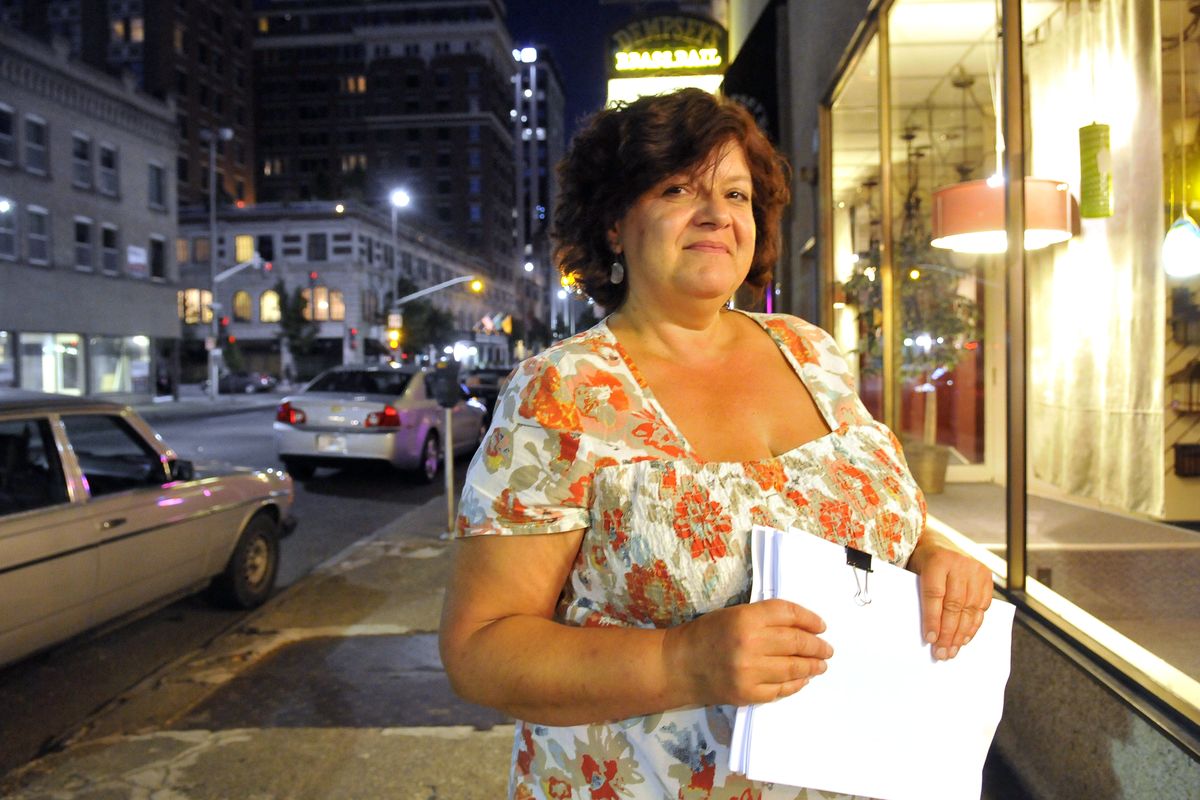Alleged Ponzi scheme in Spokane leaves lives shattered
Little Loan Shoppe investors are being sued in bankruptcy court
Monique Olsen, pictured last week, and her husband say they lost several hundred thousand dollars in investments.
Hundreds of investors victimized in an alleged Spokane-based Ponzi scheme are now being sued by bankruptcy officials attempting to unravel the complicated case of Little Loan Shoppe.
Some investors call it a “salt-in-the-wound” effort to wring money from those who were scammed out of their savings.
But the bankruptcy trustee pursuing this aptly named “claw-back” litigation said it may be the only way to ensure a fair payout. Cash collected from investors who received any kind of payment from Little Loan Shoppe will be pooled with other recoveries and redistributed equitably.
The company collapsed into bankruptcy in 2009; the U.S. Securities and Exchange Commission alleged in a civil complaint filed this week that founder Doris “Dee” Nelson raised about $135 million from more than 650 investors from 1999 to 2008. About 75 percent of the investors were members of the Jehovah’s Witnesses denomination, court records say.
About half of those investors didn’t recover their initial investment, although many received interest payments on their investments, according to Bruce Kriegman, bankruptcy trustee. Some investors were able to withdraw their principal investment plus interest before the payday loan business failed. But about 50 investors have not received anything – the hallmark of a Ponzi scheme where early investors are repaid with deposits of new investors.
The claw-back lawsuits filed in U.S. Bankruptcy Court in Spokane against about 700 investors, affiliated companies and Nelson’s family members have drawn the ire of people who say they have had their retirement nest eggs zeroed out and college savings for children erased. In some instances, families were left destitute.
“We’ve lost everything and can’t even afford to return home,” said Russell Titmas, who invested his savings while performing missionary work in southern Mexico for the Jehovah’s Witnesses. “Now they want more.”
Payday loans ‘a good thing’
Monique Olsen waves a sheaf of legal papers that detail the end of a friendship.
“How could she?” Olsen said last week, during a stopover in Spokane, of her friend Doris Nelson. “I just want to ask, ‘Why? Why did you steal from us? Why didn’t you tell us you were in trouble?’ ”
Olsen and her husband, Steve Briscoe, lost several hundred thousand dollars investing with their friend Nelson, the woman federal investigators say orchestrated the Ponzi scheme behind the veil of seemingly profitable payday loan enterprise Little Loan Shoppe.
Not only did Olsen invest, but she also encouraged her children and a sister to invest in what she was assured was a legitimate business run by her bright and entrepreneurial friend. She even talked her aging parents into safeguarding their money with Little Loan Shoppe and its sunny balance sheets and guaranteed annual returns exceeding 40 percent.
Dee Nelson was selling phone book advertisements during the summer of 1997 when her own financial problems led her right into opportunity.
As a single mother of three living in Mission, B.C., on the outskirts of Vancouver, she borrowed money from a short-term lender. She repaid her loan – plus fees.
She befriended the business owner and soon the two became business partners in a store in the neighboring city of Abbotsford, B.C.
“The deal kind of fell into her lap, but Dee is a smart woman and was astute enough to know what a good thing it was,” Olsen said.
One night over drinks with a group of friends from Mission, Nelson talked about how she had taken over the blossoming business. Her business partner had a conflict of interest and had bowed out.
“Dee needed money because she thought that business was really ready to fly,” Olsen said. “She even considered putting up her house, but worried that if she was wrong, she wouldn’t have anywhere to live.”
So Olsen and several friends there that night agreed to each chip in a couple thousand dollars. Nelson used the money to open two more payday loan stores in Canada, one in Chilliwack, the other in Maple Ridge.
“That’s not the kind of business plan a woman can take to the bank and get a loan for,” Olsen said.
The money soon began to flow and Nelson repaid her friends. They told her to roll their money back into the business.
In 2001 Dee married Dennis Nelson and the couple moved to Spokane, where they eventually operated four stores along with the three in Canada.
The business grew in scope and complexity. Apparently, according to federal authorities, much of it was a fraud.
“It didn’t start out as a bad story,” Olsen said. “It’s just tragic how things have gone.”
Nelson denies wrongdoing
The Nelsons say the Securities and Exchange Commission has it all wrong.
Outside her Colbert home Thursday afternoon, Dee Nelson cried. Her family has been treated unfairly and her business seized, she said.
She is being sued for money she doesn’t have, including $4.9 million trustee Kriegman is attempting to extract to repay investors. Her family – including husband Dennis and her children – are in financial trouble, too, as Kriegman sues to recover another $780,000 from them.
Their large home – valued at about $650,000 – is “mortgaged to the hilt,” Dennis Nelson said.
A Corvette and a Mercedes that were seized by federal officials were leased, not owned, he said.
“We just feel like everything that’s been said about us is one-sided,” he said. “There’s another side to this story. I hope you get it someday because the legal system in Spokane isn’t giving it.”
Dee Nelson referred questions about the case to her attorneys, Conrad Lysiak and Carl Oreskovich.
Lysiak is handling some of the bankruptcy issues. Oreskovich, a noted criminal defense attorney, is advising Nelson on other matters. Oreskovich said Nelson denies any wrongdoing.
There have been no criminal charges filed against Nelson or others associated with the alleged Ponzi scheme.
Frank Harrill, supervisory senior resident agent for the Spokane office of the FBI, told The Spokesman-Review this week that a decision to either press criminal charges or close the investigation will be made this fall.
Olsen, Dee Nelson’s longtime friend, puzzles over how it got so bad so fast.
At one point in late 2008, when the business neared collapse, Nelson called Olsen’s mother in Canada and pleaded with her to invest another $70,000. She was hesitant, but Nelson pressed.
Weeks later, all of it was gone.
“I don’t see Dee as some evil person,” Olsen said, “but how could she do that to my mother? My family?”
She believes Nelson simply got in too deep, too fast. That perhaps she came to owe too much money to the “wrong kind of people.”
And before long it was too late to undo the damage.
Religious leader attracted investors
For most of his life, Russell Titmas plied his carpentry skills into a modest living. He helped build homes and businesses in New Jersey and raised six children.
Even as Wall Street pulsed nearby, “I never invested a dime,” he said. He worked with his hands and kept his earnings within reach.
When he retired a few years back, he answered the call of his religion and moved to southern Mexico. As a Jehovah’s Witnesses missionary, he shared the word of his religion and found community among other missionaries.
It’s where he met Paul Cooper in 2006, a religious teacher and elder with a reputation as a financial rainmaker.
The word among the small network of Jehovah’s Witnesses in Mexico was that Cooper owned a spectacular home in Acapulco, funded charitable works and, if you were chosen, would share his gift.
“There was all this positive talk about him,” Titmas recalled.
So he was thrilled one day when Cooper approached him.
“I was given the chance to make a dream investment,” Titmas recalled. “He called me a special person … and said I had only a brief window of opportunity to invest.”
Cooper offered a chance to invest in a “successful” payday loan business in Spokane. Titmas took a few days to make some calls to trusted friends and religious peers.
“To the person, everyone that I spoke with had positive things to say about (Cooper),” Titmas said. “They were already invested and had good experiences.”
Titmas wanted the financial security, and saw the investment as an opportunity to offer financial assistance to his faith and enhance its missionary work.
“That was our dream, to help others,” he said.
The paperwork detailing his investment and interest payments arrived on cue. He reinvested those interest checks.
Then in 2008 Titmas received a call from Cooper about another big investment opportunity. Titmas jumped at the chance.
He had just sold his home in New Jersey for a $100,000 profit.
“I have no idea where my brains went,” he said, “but I immediately went to the bank, and just like that the money was gone.”
The claw-back litigation is seeking $80,000 from Titmas, even though he lost a total of about $270,000. “I have $2,000 to my name, and now I’m worried that they’ll try to garnish about 30 percent of my Social Security. That’s all I have,” he said.
Lawyers involved in the case refer to these scenarios as affinity fraud.
“People are embarrassed, but the lines of reasoning to make that kind of investment seem to fit for them,” said Ford Elsaesser, a Sandpoint attorney hired by investors who lost money with Little Loan Shoppe.
Many of Elsaesser’s clients are Jehovah’s Witnesses who invested based on the testimonials offered by religious friends and family. He disagrees with trustee Kriegman that the claw-back litigation is the appropriate means to an equitable distribution.
“These people are being victimized twice,” he said.
For his role, Cooper has been sued, too. He had set up his own company that solicited investments for Nelson, skimmed a commission off the top and then wired the remainder to Little Loan Shoppe, according to a court-ordered examination. The trustee seeks more than $2.5 million from him.
Faith and money are so intertwined in this case that some investors who didn’t want to be identified for this story do not believe Cooper, who no longer holds a leadership position in the Jehovah’s Witnesses, did anything wrong.
Cash stockpile dwindling
Kriegman, who was hired as the trustee in April, said he had to file the claw-back lawsuits this summer to meet a rapidly approaching legal deadline.
The purpose, he said, “is to seek a fair return for all investors.”
He acknowledged that such lawsuits are upsetting to those who lost large sums. He declined to speculate on how much money might be recovered and eventually distributed.
Such litigation has gained notoriety in the wake of the vast Bernard Madoff case.
In that unfolding action, claw-back suits have targeted “net winners” – people who got back their principal investment plus interest.
In the Little Loan Shoppe case, most of those people are being represented by Seattle attorney Dillon Jackson, who said if Little Loan Shoppe was a Ponzi scheme, his clients weren’t privy and shouldn’t have to surrender their money. He and Elsaesser’s clients – described as “net losers” because they lost most or all of their principal – will attempt to work together to present other options to handling the case.
The entire endeavor will be expensive in a case that is running short on cash.
The most recent monthly accounting shows there’s about $1.1 million in cash left from Little Loan Shoppe’s operations. The company is also owed about $8 million in outstanding loans, but accountants for the bankruptcy trustee estimate that about $5 million of those loans are uncollectible.
The deteriorating balance sheet is alarming in the face of mounting legal fees, said attorney David Gardner, who represents creditors in the case, which includes many of the people who lost money.
Kriegman, along with accountants and attorneys from Witherspoon Kelley hired to pursue the claw-back litigation, have billed the bankruptcy estate about $450,000.
A special investigator hired to examine Little Loan Shoppe’s business dealings – because the company’s financial reports were so unreliable – is being paid about $356,000.
Kriegman has now hired another team of lawyers to draft a reorganization plan – blueprints for sewing shut the bankruptcy and repaying creditors. A deadline for filing the plan has not been set, though Kriegman said his work as trustee on the case has moved quickly with the interests of all creditors in mind.
He is mindful of the losses and disappointment.
“I don’t think anyone is happy about any of this,” Kriegman said. “We will try to quickly bring about a fair and equitable situation.”



